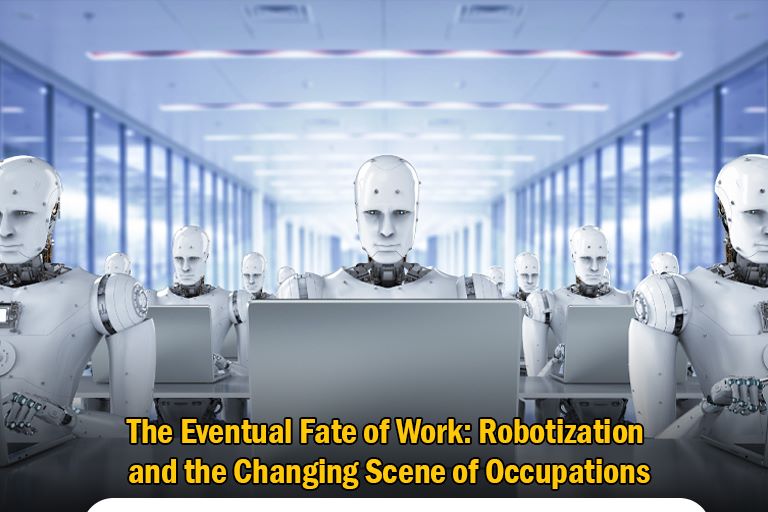
The Eventual Fate of Work: Robotization and the Changing Scene of Occupations
The universe of work is going through a significant change, driven by the fast progression of innovation and computerization. From man-made reasoning to mechanical technology, arising advances are reshaping ventures and testing customary ideas of work. As we explore the intricacies of this moving scene, it is urgent to figure out the effect of computerization on positions and investigate how people and social orders can adjust to flourish in store for work.
- Automation: A Situation with two sides:
Robotization, with its capability to smooth out processes, increment productivity, and decrease costs, has been hailed as an extraordinary power across businesses. Be that as it may, it likewise presents a situation with two sides, as the expanded dependence on machines and calculations takes steps to dislodge human laborers. Dreary and routine undertakings that can be computerized are the most vulnerable to interruption. Subsequently, many trepidation far-reaching employment misfortunes and a developing split between those furnished with the abilities to explore the computerized age and those abandoned.
- The Developing Nature of Occupations:
While computerization might take out certain positions, it additionally makes ready for the production of new jobs. The scene of work is moving towards occupations that require particular human abilities like inventiveness, decisive reasoning, sympathy, and complex critical thinking. Occupations that include elevated degrees of social collaboration, the capacity to appreciate anyone at their core, and versatility are more averse to being robotized. As machines take over dull errands, people will progressively zero in on regions where their remarkable capacities sparkle, prompting a change in perspective in the labor force.
- Upskilling and Reskilling:
Key to Flourishing from here on out To stay applicable in the time of mechanization, people should embrace deep-rooted mastering and constantly update their abilities. Upskilling and reskilling will assume a vital part in guaranteeing employability and professional success. States, instructive foundations, and organizations need to team up to give open and reasonable preparation programs that furnish laborers with the essential computerized education, specialized aptitude, and delicate abilities expected to flourish later in the work market. Deep-rooted learning ought to turn into a cultural standard to connect the abilities hole and cultivate a culture of persistent development and transformation.
- Embracing New Open Doors:
Mechanization doesn’t exclusively represent a danger; it likewise opens up new open doors for development and business. As normal errands become mechanized, laborers can move their concentration to higher-esteem exercises. The ascent of the gig economy and remote work further expands business choices and empowers people to make their way. The eventual fate of work holds the potential for adaptable work courses of action, far-off joint effort, and expanded balance between fun and serious activities, giving people more independence and opportunity in their expert lives.
- Addressing Financial Difficulties:
While robotization guarantees expanded efficiency and financial development, it additionally presents cultural difficulties. The change to a mechanized labor force requires proactive measures to address potential work relocation and pay disparity. States and policymakers should carry out hearty social well-being nets, retraining projects, and occupation arrangement administrations to help laborers impacted via robotization. Furthermore, cultivating comprehensive development and guaranteeing equivalent admittance to mechanical progressions will be essential to forestall a computerized partition and advance financial value.
- Redefining the Labor force:
Robotization and innovation are reshaping the actual idea of a conventional labor force. The ascent of remote work, independent stages, and the gig economy has obscured the limits of business. As robotization assumes control over routine errands, laborers have the chance to take part in project-based work, team up with different groups, and make their arrangement of abilities and aptitudes. This adaptability permits people to find work that lines up with their interests and assets while adjusting to changing business sector requests.
- Collaborative Human-Machine Organizations:
As opposed to surveying robotization as a trade for human laborers, a more productive methodology is to think about the potential for cooperative organizations among people and machines. As machines handle dull errands, people can zero in on regions that require imagination, instinct, and development. The mix of human resourcefulness and the logical force of machines can prompt upgraded efficiency, better direction, and advancement headways in different fields.
- The Job of The ability to appreciate individuals on a deeper level:
While mechanization succeeds at information handling and examination, it misses the mark on the capacity to comprehend and explore complex human feelings. Occupations that include sympathy, the ability to appreciate anyone on a deeper level, and individual connection, for example, providing care, guiding, and client support, will remain dominatingly human-driven. Developing the ability to appreciate anyone on a deeper level and relational abilities will turn out to be progressively important as they won’t be quickly recreated by machines.
- Ethical Contemplations and Human-Focused Plan:
As robotization turns out to be more predominant, moral contemplations encompassing protection, information security, and algorithmic predisposition become critical. Human-focused plan standards ought to direct the advancement of computerization innovations to guarantee that they line up with cultural qualities and focus on human prosperity. Organizations and policymakers should lay out powerful structures to address moral difficulties and shield against the unfortunate results of uncontrolled computerization.
- Lifelong Learning Environments:
In store for work, the center ought to move from conventional, direct professional ways to nonstop mastering and abilities advancement. Making long-lasting gaining environments will require cooperative exertion from instructive organizations, managers, and people. Learning stages, apprenticeship projects, and mentorship amazing open doors that can empower laborers to obtain new abilities, adjust to arising innovations, and explore professional changes. Legislatures can uphold this shift by putting resources into instruction and preparing a framework and advancing a culture of learning.
- Beyond Customary Measurements of Achievement:
With robotization reshaping the work market, rethinking the measurements of progress past absolute financial indicators is fundamental. The fate of work ought to focus on prosperity, work fulfillment, and significant commitments to society. This shift requires a significant impact on outlook where people, associations, and policymakers esteem balance between serious and fun activities, psychological well-being, and the quest for satisfying professions that line up with individual qualities.
Conclusion:
The eventual fate of work is without a doubt being reshaped via robotization and innovative progressions. While it brings the two potential open doors and difficulties, adjusting to this changing scene requires a proactive and cooperative methodology. By embracing long-lasting picking up, upskilling, and reskilling, people can set themselves up for the positions representing things to come. Legislatures, organizations, and social orders should cooperate to establish a climate that empowers development, upholds uprooted laborers, and guarantees impartial admittance to the advantages of computerization. With the right procedures and mentality, we can saddle the force of mechanization to make a fate of work that isn’t just effective yet additionally comprehensive and enabling.
Read more – The Significance of Vehicle Support: Ways to Keep Your Vehicle in Top Shape
Read more – Style as a Type of Activism: How Dress Can Offer a Social Expression



